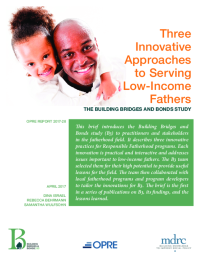Three Innovative Approaches to Serving Low-Income Fathers
The Building Bridges and Bonds (B3) Study

This brief introduces the Building Bridges and Bonds study (B3) to practitioners and stakeholders in the fatherhood field. It describes three innovative practices for Responsible Fatherhood programs. Each innovation is practical and interactive and addresses issues important to low-income fathers. The B3 team selected them for their high potential to provide useful lessons for the field. The team then collaborated with local fatherhood programs and program developers to tailor the innovations for B3. The brief is the first in a series of publications on B3, its findings, and the lessons learned.
A father’s support — both financial and emotional — has been linked to better outcomes on nearly every measure of a child’s well-being, from cognitive development and educational achievement to self-esteem and positive behaviors toward others. However, many fathers, particularly low-income fathers, struggle to provide support. Personal and societal barriers get in the way, such as low levels of education, stigma from criminal records, declining wages for low-skilled men, or family instability. These challenges have led the field to search for innovative programming that supports men and their families.
Local organizations across the United States are responding by implementing Responsible Fatherhood programs. Responsible Fatherhood programs aim to improve the well-being of fathers and their children by addressing the particular challenges they face. These programs often play an important role in communities, particularly low-income communities, giving fathers a place to reflect on their familial role and plan for better futures for themselves and their children. The federal government supports these efforts through the Healthy Marriage and Responsible Fatherhood initiative, a $150 million discretionary grant program administered by Office of Family Assistance (OFA). In 2015, OFA awarded five-year Responsible Fatherhood grants to 39 organizations, Healthy Marriage grants to 46 organizations, and an additional five awards to programs that serve incarcerated fathers and fathers reentering society. Qualifying fatherhood programs use a range of curricula and practices tailored to the needs of local participants to address three primary issues: responsible parenting, healthy marriage and co-parent relationships, and economic stability.
B3 is a partnership between six organizations that provide Responsible Fatherhood services, the MDRC-led study team, and the project funder, the U.S. Department of Health and Human Services, Administration for Children and Families. B3 seeks to identify services that can measurably improve the outcomes of fathers who participate in Responsible Fatherhood programs. The study is designed to rigorously assess new and emerging service approaches in the field over the next three years.
In 2016, each of the six local programs participating in B3 added one or two program components or innovations to the usual services it offered. Practitioners will learn two main lessons from the study:
- Whether any or all of the innovations have an impact on (or make a difference in) the lives of participating fathers and their children, greater than the standard services that programs offer
- How programs engaged fathers and implemented the services, both the innovations and existing services for fathers
As the study progresses, the B3 team plans to provide practitioners with updated information about whether these approaches work, what fathers (and even mothers) are saying about them, and what strategies local programs are using to deliver them. The team hopes that B3 will contribute to the broader evidence-based research on services for fathers and provide actionable information about the three specific innovations tested.






